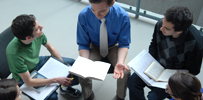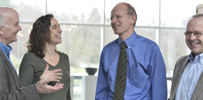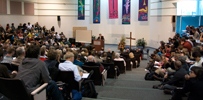David Robinson on the “Bonhoeffer Moment,” His Personal Motto, and Balancing Academics with Pastoral Ministry and Fatherhood

David is a visiting scholar in theological ethics at Regent College for the 2017-18 year. He is currently preparing his book, Christ and Revelatory Community in Bonhoeffer’s Reception of Hegel, which will be published in May with Mohr Siebeck. He recently completed his doctorate in Systematic Theology and Ethics at New College, University of Edinburgh. An ordained minister, David has served with Anglican churches in Ottawa and Episcopal churches in Edinburgh.
He will be delivering a lunchtime lecture at Regent on Wednesday, Feb 28, entitled "Protestantism without Reformation—Bonhoeffer's View of the North American Churches."
Tell us about your time at Regent College
What I found at Regent was a winsome spirit of evangelicalism. Professors and fellow students taught me to be historically conscious about ‘evangelical’ as both a term and a lived identity. Regent also taught me to attempt to do reparation where there have been blind spots. Throughout my courses, I found a creative spirit, rather than a reactive one, and a constructive moral vision instead of pandering to narratives of decline. So it was training in a posture that wasn't based in fear. I deeply appreciate that, and I think it's really needed, especially now.
You were ordained in 2009 and have worked in both Anglican and Episcopal churches. Can you comment further on how you have tried to balance your pursuits in ministry with your academic pursuits?
I have to confess that I don't think I do balance very well. That’s partly because my week is mainly spent caring for a rambunctious toddler. But I have also been trained to pursue something other than balance. I remember one mentor, in particular, talking about what it means as a theologian to, before all else, be responsive to the Word, the Word being God’s address to us in our forms of life across different seasons. Sometimes God’s call will provide you a feeling of equilibrium between academic work and other ministry opportunities.
But sometimes it can mean that you have an intense period where life feels a bit out of control—starting a new ministry, for instance, or that final period of “writing up” a thesis. The important thing for me is to be able to say that I’m responding to God at that moment, giving my all where I’m called to serve. Right now, I’m primarily an academic and dad; while I certainly take part in the church, I’m not that active in leadership. That’s the shape of my obedience for this season and I’m finding new clarity and joy here.
Maybe twenty years from now I'll be able to give you a better answer. Maybe part of it is that I’ve had a period of four years in ministry, then four years in PhD work, now a combination of full-time parenting and writing. Certainly in both cases I sought the other community: as a pastor in Ottawa I was regularly involved on the neighbouring university campus, and as a doctoral student in Scotland, I was regularly involved in the local churches. Then there are times when the communities overlap: a big joy of my time in Scotland was working with Iain Provan and other Regent alum as they founded the Abbey Summer School, where they insist on integration.
You mentioned that your academic pursuits emerge from pastoral concerns. Could you trace for us what pastoral concern your doctoral topic emerged from, and bring those two things together?
Happy to. I was fascinated to start pastoring in Ottawa—because I came from the prairies and the West Coast—where I could see all these historic church buildings. The church I worked in was built around the time of Confederation. But many of these old buildings were being put to other uses as their congregations had moved on or dwindled such that they couldn’t maintain the structure any longer. I remember one year, especially, when the Ottawa Writers’ Festival events were hosted at St. Brigid’s—an Irish Catholic Church that is now a centre for the arts. I was hearing poets and politicians speaking on their work in this cavernous space, which, surprisingly, still had a lot of overt religious symbolism: the Stations of the Cross remained and there was what appeared to be life-size crucifix with a garish red wound in Christ’s side.
Those symbols were surprising because the space was, as they say, “deconsecrated.” So the original purpose for which the building was set apart, as a site for the revelation of God, had come to an end. The experience of hearing contemporary writers speak in “deconsecrated space” really stuck with me. It pressed me to think about what it means for someone, believer or otherwise, to see God as absent, or the church as dead. How do you account for that kind of perception theologically, how do you frame the lived experience of “deconsecration” in terms of who God is and how God acts in the world?
So, to the doctoral project. One of the questions Bonhoeffer asked in an early book is how revelation can be more than a discrete “act” of God that confronts the believer. He also wanted to speak of God as manifest in the life, the being, of the community. I came to the subject matter seeking continuity: how is God revealed in, through, and after a “deconsecration,” if at all? How about on the other side of church division? In the biblical story, the question is how might God be revealed through and after exile?
In trying to follow Bonhoeffer’s thinking about the church, I saw how much the philosopher Hegel was part of the background in which he wrote. Bonhoeffer explicitly adapts his line “God existing as community,” for example. The term “revelatory community,” which I use in the book title, also comes from him.
What's your hope for your time at Regent?
I'm excited to be here for two main reasons: First, I think the discipline of theological ethics is a very promising one, and it's one that I was first introduced to here. Now there are a few more of us around, which is good because I think it's an important time for Regent with respect to this field. I just went to the Society of Christian Ethics annual meeting with Jeff Greenman, and we were able to think together about what it means to do theological ethics as an evangelical. David Gushee, the Society’s president at the time of the conference, claims to have followed Jesus out of American evangelicalism. Ten years ago he was writing about reclaiming the evangelical centre. So what has happened? Soul searching is definitely needed in response to such testimonies of disenchantment, and Regent has a lot to offer in that critical task.
Second, I'm excited to share currents in Bonhoeffer research here because my time nicely coincides with Jens Zimmermann coming to teach in this area. I've benefitted a lot from work with him. Speaking about evangelical scholarship again, I think Bonhoeffer is a very generative source for us. But evangelicals are often tempted to focus on the biography or myth – the two can be hard to tell apart – of the man. I want to work with that energy, but also want people to be introduced to Bonhoeffer’s primary sources as well as the literature he was reading and engaging with.
When you're not doing theology or ministry, what are ways you like to spend your time?
I love novels. My wife has the better literary taste, so I enjoy her recommendations. She started me with novels as different as David Mitchell’s Cloud Atlas and Willa Cather’s Death Comes for the Archbishop before we began dating. The attraction was obvious. Now, if I’m finding any kind of balance in life, it’s likely because I’m reading along her lines. Of course, I also immensely enjoy time spent with my daughter.
How old is she?
She's two. So exploring language with her has been a delight. At the risk of leaving the active side of our lives unmentioned, she never tires of bringing me books. Her favourite titles have to do with a family of pigs or a pair of turtles and a hat.
Your website is framed by the lines "in fine excess of the occasion of communication” and “we have no austere God." Where do those words come from?
The first line is from Robert Alter. I actually first read that while a Regent student: it was from The Art of Biblical Narrative, where he’s describing how the biblical writings function. So by “fine” you identify the precision: there's a care and a sparsity to Hebrew narrative. But there's also “excess”: it releases the imagination; it evokes the reader into the fullness of a divine revelatory event.
It's the pairing of precision and super-abundance that I love. And it's become a kind of inspiration for the website, where I’ve done biblical commentary and review the kind of writing that doesn’t settle for one or the other.
"We have no austere God," meanwhile, is a related phrase that came to me.
Is it a personal motto as well as a writing motto?
I think you could say that. I’ve found that my vision for life is both more vague and more narrow than what God actually has in store. There's a precision but also an expansiveness to [God’s vision for my life], and I've often loved the language of the Psalmist: “He brought me out into a broad place; he delivered me because he delighted in me.”
If you've been through a period of unemployment, as I have, to think about that as a period of spaciousness rather than merely constriction and pressure makes all the difference. “We have no austere God”—that was actually given to me in a period of unemployment. So it sure was a personal statement, my way of bearing witness. I hope that others will find it to ring true for them, even in times of serious economic pressures.
What are ways that people could engage with the topics that you've mentioned or with you if they have a particular interest?
If any of these topics are of interest, I'd be very happy to talk about them. In fact, I’ll be giving a lunchtime lecture on February 28th that would provide a good window into my work. It’s titled “Protestantism Without Reformation: Bonhoeffer’s View of the North American Churches.” Some people will be familiar with the statement that “it’s a Bonhoeffer moment in America.” It’s been used in response to a controversial war, to legal changes, and to the rise of the alt-right. Some of these uses are better, some are worse. What I’m proposing is that we look for that “moment” in the short period where Bonhoeffer came to America as a refugee, the summer of 1939. In spite of all that was on his mind, he wrote a perceptive essay that traced how Americans have more of a “denominational” than an “ecclesial” understanding of community. This affects how subjects like race and international relations are dealt with, both very pertinent contemporary themes. But his comments aren’t that widely known. To put it provocatively, I’d say that North Americans are often too busy appropriating Bonhoeffer to hear what he actually said about church life when he lived here.
Beyond my research interests, though, I have a real interest in supporting people as they discern their vocations. Obviously there are diverse callings people find their way into while they’re at Regent. I would probably benefit people most with respect with the call to ministry or the call to scholarship. Each of these callings require courage and faith. They also require a community within which to deliberate, so I'm glad to take time for those conversations.
I'm here on Wednesdays primarily. My office is right by the Lookout Gallery. I'd be happy to meet there. Or students can certainly email me and ask to set up a meeting.
Want to connect more with David? Check out his website, or send him an email at [email protected].




